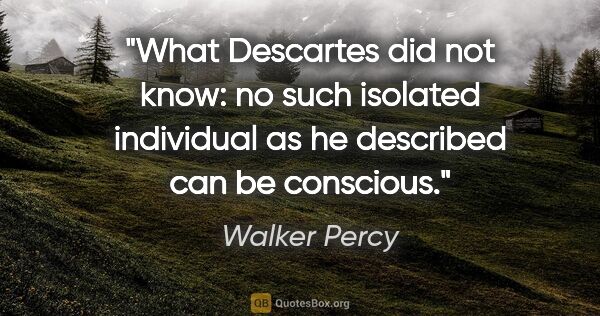Describe Quotes (page 27)
Author describes one character's optimism as, that quiet well-being which perhaps you and I have felt on a sunny afternoon when, in our brightest youth and health, life has opened a new vista for us, and long to-morrows of activity have stretched before us like a lovely plain which there was no need for hurrying to look at, because it was all our own.
George Eliot
We are living in a culture entirely hypnotized by the illusion of time, in which the so-called present moment is felt as nothing but an infintesimal hairline between an all-powerfully causative past and an absorbingly important future. We have no present. Our consciousness is almost completely preoccupied with memory and expectation. We do not realize that there never was, is, nor will be any other experience than present experience. We are therefore out of touch with reality. We confuse the...
Alan Watts
You call a star a star, and say it is just a ball of matter moving on a mathematical course. But that is merely how you see it. By so naming things and describing them you are only inventing your own terms about them. And just as speech is invention about objects and ideas, so myth is invention about truth.
Humphrey Carpenter
What Brahman is cannot be described. All things in the world? the Vedas, the Puranas, the Tantras, the six systems of philosophy? have been defiled, like food that has been touched by the tongue, for they have been read or uttered by the tongue. Only one thing has not been defiled in this way, and that is Brahman. No one has ever been able to say what Brahman is.
Ramakrishna
You see, it's really quite simple. A simile is just a mode of comparison employing 'as' and 'like' to reveal the hidden character or essence of whatever we want to describe, and through the use of fancy, association, contrast, extension, or imagination, to enlarge our understanding or perception of human experience and observation.
Norton Juster
He thought of how convincingly he could describe this scene to friends and make them envy the fullness of his contentment. Why couldn't he convince himself? He had everything he'd ever wanted. He had wanted superiority--and for the last year he had been the undisputed leader of his profession. He had wanted fame--and he had five thick albums of clippings. He had wanted wealth--and he had enough to insure luxury for the rest of his life. He had everything anyone ever wanted. How many people...
Ayn Rand
I understand what you mean, and I believe in this girl. Anyone you love must be marvellous, and any girl that has the effect you describe must be fine and noble. To spiritualise one's age--that is something worth doing. If this girl can give a soul to those who have lived without one, if she can create the sense of beauty in people whose lives have been sordid and ugly, if she can strip them of their selfishness and lend them tears for sorrows that are not their own, she is worthy of all your...
Oscar Wilde
There is still one of which you never speak.'
Marco Polo bowed his head.
'Venice,' the Khan said.
Marco smiled. 'What else do you believe I have been talking to you about?'
The emperor did not turn a hair. 'And yet I have never heard you mention that name.'
And Polo said: 'Every time I describe a city I am saying something about Venice.
Italo Calvino

Idealism, though just in its premises, and often daring and honest in their application, is stultified by the exclusive intellectualism of its own methods: by its fatal trust in the squirrel-work of the industrious brain instead of the piercing vision of the desirous heart. It interests man, but does not involve him in its processes: does not catch him up to the new and more real life which it describes. Hence the thing that matters, the living thing, has somehow escaped it; and its...
Evelyn Underhill
the surface of the earth crusted. a thin hard crust, and as the sky became pale, so the earth became pale, pink in the red contry and white in the gray contry." (1) this describes the form of the book how the earth has been swallowed by the sun and allows you to assume that the farms are destroded
John Steinbeck